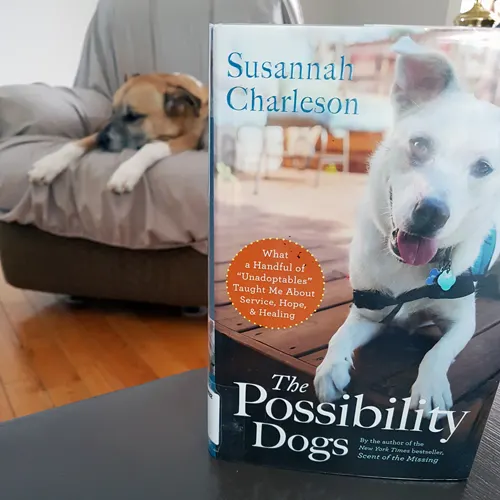The world of service dogs is diverse and complex. While guide dogs or search and rescue dogs are the most familiar, there is a whole pack of dogs who help people through a variety of challenges. And the field is growing.
Dogs provide important support to people dealing with mental, emotional and physical issues.
In The Possibility Dogs: What I Learned from Second-Chance Rescues About Service, Hope, and Healing, the author Susannah Charleson takes us into the world of service dogs and the challenges and rewards of working with these special animals. Get the book on Amazon here.
The Possibility Dogs – book review
Charleson comes at her topic from two specific perspectives—psychiatric service and rescue.
She has a background in traditional search and rescue, where many of the people she is looking for are in a mental or psychological crisis. For her, it’s a short journey to dogs that serve the human mind—and who may help to prevent that crisis.
On the (dog) rescue side of the story, Charleson has adopted and fostered numerous needy dogs, even while her search dogs have been carefully bred and selected specifically for search work.
While many service dogs are born into their careers and put through regimented puppy raising and training systems, Charleson wants to test the potential of rescue dogs—dogs with possibly no background in service—to meet the needs of humans.
Charleson defines potential service dogs as “good pet candidates with something extra.”
They have to be highly motivated, relaxed in various settings and “most important, they like humans a lot.”
Part of Charleson’s evaluation and training of her dogs is finding the work that suits them best, whether it’s helping someone with OCD or anxiety or depression or PTSD.
Charleson goes over the evaluation process she uses, even putting her own dogs to the test to see how they fare. When she eventually adopts a new dog and begins to train him for service, she chronicles the process. I was particularly interested in how she taught specific skills.
Teaching the dogs specific skills
First she chose the command “door,” where her dog had to guide her to the nearest exit. “Door” is helpful for someone who may have a panic attack and become disoriented and need help exiting a building. Then she taught him to intervene when she obsessively checked the stove to make sure it was off, a common behaviour for some people with OCD.
Charleson also touches on dogs who start as pets and move into service roles with their owners. She makes sure to distinguish that these are not service dogs in name only. Or “a sensitive pet who is devoted to her owner.”
The move to service dog takes careful training to recognize a person’s needs—for example, the start of an anxiety attack or compulsive episode—and to understand how to intervene and redirect that person’s behaviour.
The Possibility Dogs also touches on the need for the general public to recognize and accept a broader definition of service dogs.
Many mental and emotional disabilities are invisible. Even if someone’s ailment is documented and their service dog is fully legitimate, “any public outing has potential conflict” as a person tries to enter stores, restaurants or other public venues with their dogs.
Overall, Charleson’s message is one of hope. Hope for both people and dogs in need.
In the stories she shares throughout the book, she shows how people’s lives have improved with the help of their dogs. And she shows how the dogs—of all kinds and backgrounds—are so in tune with their humans and so suited to their work that they too lead incredibly fulfilled lives.
Have you taught your dog any special skills?
How does your dog help you through challenging emotional or psychological situations?
Where do you think dogs have the greatest potential for service?
Julia Thomson is a blogger at Home on 129 Acres where she writes about her adventures of country living and DIY renovating. She and her family live on a 129-acre farm in Ontario, Canada. Follow Julia on Instagram here.


Colby
Tuesday 24th of July 2018
As a puppy raiser I get to see part of this story. One of my goals is to someday do exactly what is chronicled in this book. I'm working to increase my skills by apprenticing at a dog training facility so I can learn to evaluate shelter dogs and hopefully train them to be service dogs.
Julia at Home on 129 Acres
Thursday 26th of July 2018
The role that you and other puppy raisers and evaluators play is huge. Charleson writes a bit about the commitment and care required to raise and train a dog and then let it go. It's impressive to be able to do that.
Lindsay Stordahl
Tuesday 24th of July 2018
That is awesome! I am excited for you!
OlRedHair
Sunday 22nd of July 2018
I have read this, and truly enjoyed it. I found it extremely well written and informative. A true gem.
Julia at Home on 129 Acres
Sunday 22nd of July 2018
Glad to hear that you enjoyed it too.